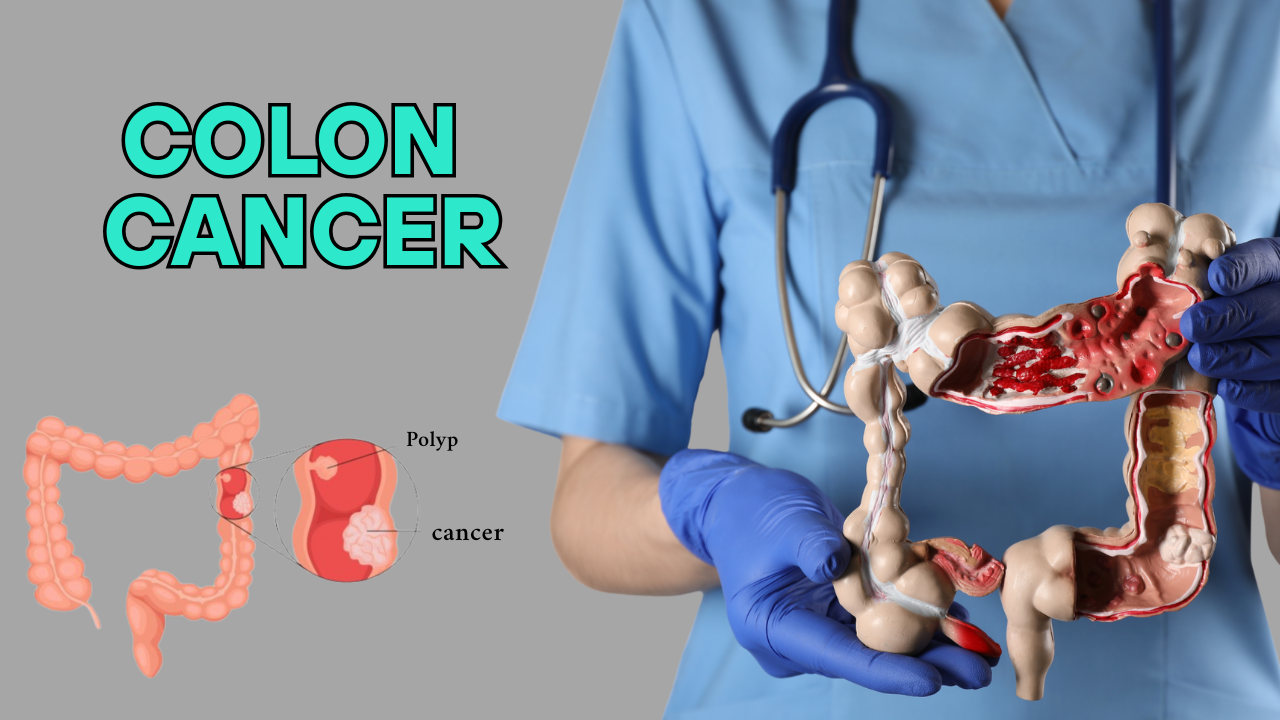- everything you need to know about -
Colon cancer
watch a
video
- HEALTH & WELLNESS -
Colon
cancer
Colon cancer, also called colorectal cancer, is one of the most common forms of cancer that affects both men and women. It begins in the large intestine (colon), which is part of the digestive system. Although it’s a serious condition, colon cancer is also one of the most preventable and treatable cancers when detected early.
Understanding how it develops, recognizing the early symptoms, and making smart choices about your lifestyle and screenings can make a life-saving difference.
🧬 What Is Colon Cancer?
Colon cancer starts as small, noncancerous growths called polyps on the inner lining of the colon or rectum. Over time, some of these polyps can become cancerous. That’s why regular screening is crucial — it helps detect and remove these polyps before they turn into something more dangerous.
In many cases, colon cancer develops without clear symptoms in the early stages, which is why it often goes undetected until it’s more advanced.
🚩 Early Signs of Colon Cancer
While colon cancer may not show obvious symptoms at first, there are warning signs to watch for:
Persistent changes in bowel habits (diarrhea or constipation)
Feeling that your bowel doesn’t empty completely
Blood in the stool or dark-colored stools
Ongoing abdominal pain, cramps, or gas
Unexplained weight loss
Fatigue or weakness
These symptoms can also be caused by other common digestive issues, so don’t panic — but don’t ignore them either. Talk to your doctor if these problems persist.
🧠 Who’s at Risk?
Certain factors can increase your chance of developing colon cancer:
Age 50 and above (though it’s rising in younger adults too)
Family history of colon or rectal cancer
Low-fiber, high-fat diet
Lack of physical activity
Smoking and alcohol use
Obesity
Inflammatory bowel diseases like Crohn’s or ulcerative colitis
Even if you don’t have these risk factors, it’s important to be aware and stay proactive about gut health.
🛡️ How to Lower Your Risk
The good news is that many cases of colon cancer can be prevented by making small lifestyle changes. Here’s what you can do:
Eat more fiber: Whole grains, fruits, and vegetables help keep your colon clean.
Limit red and processed meats: These can raise your risk over time.
Exercise regularly: Even 30 minutes a day can make a big impact.
Avoid smoking and reduce alcohol.
Maintain a healthy weight.
Get regular colon cancer screening — starting at age 45 or earlier if you’re high-risk.
Colon health is often overlooked until something goes wrong. Make it a priority before problems start.
🩺 What Is Colon Cancer Screening?
Screening means testing for a disease before symptoms appear. For colon cancer, this can be life-saving. Here are the main types of screening:
Colonoscopy: The most thorough test. It checks the entire colon and allows for polyp removal.
Stool tests: These check for hidden blood or abnormal DNA in your stool.
Flexible sigmoidoscopy: A less invasive test that checks part of the colon.
Your doctor can recommend the right test for you based on your age, health, and family history.
❤️ Why Colon Cancer Awareness Matters
Colon cancer is often preventable, yet thousands of people are diagnosed each year because they didn’t know the risks or symptoms. Raising awareness helps save lives by encouraging more people to get screened and adopt healthier habits.
If you’re feeling hesitant about getting a colonoscopy or talking to your doctor, remember this: catching colon cancer early can mean a simple outpatient treatment rather than a life-threatening disease.
🔁 Real Stories, Real Impact
Many people who survive colon cancer say they never expected it. Often, they were healthy, active, and had no symptoms. What saved them was routine screening or paying attention to something unusual.
It’s not just about cancer — it’s about being in tune with your body, taking small actions that protect your long-term wellness, and encouraging your loved ones to do the same.
🧾 Final Takeaway: Small Steps, Big Difference
Colon cancer doesn’t have to be scary. With early detection and healthy choices, it’s something you can prevent, treat, and beat.
So here’s your gentle reminder:
Prioritize gut health.
Talk to your doctor about screenings.
Listen to your body.
Don’t delay when something feels off.
Your future self will thank you.
Take charge of your colon health — it’s not just about digestion, it’s about life.

